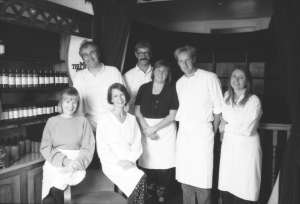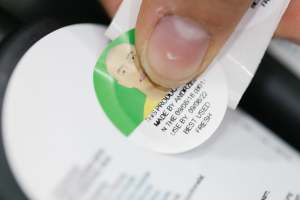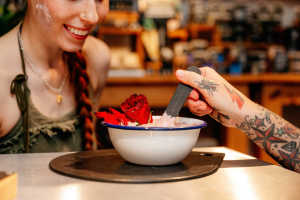The foundations of Lush are in fresh, handmade manufacturing. Fresh and handmade is not just our brand name, it’s our business model and at the heart of how we have built a global manufacturing business.
The roots of our handmade manufacturing stretch back to before Lush, to the passion of co-founders Mark Constantine and Liz Bennett, for making effective products with fresh and natural ingredients. It was this passion that sparked the relationship between Constantine and Weir and The Body Shop, and saw the Lush co-founders as the contract manufacturer and product inventors, for The Body Shop’s most recognisable ranges.
The Lush Founders (left to right) Helen, Mark, Liz, Paul, Mo, (Mike, Ro’s husband) and Rowena:

products made in FY2024 alone
Handmade
Through the roots of Constantine and Weir, to Cosmetics to Go, and into Lush, handmade has grown from inventions made above 29 High Street and in Mo Constantine’s garden shed, to a global manufacturing business. When Lush opened in 1995, we did so with a range of 100 products, all of which were upstairs at 29 High Street, Poole (we still have a shop there).
Today, our factories are not assembly lines but well-equipped kitchens. Skilled compounders chop, juice and infuse these ingredients by hand into batches they are proud to put their name (and face sticker) to. We have built our entire business infrastructure around making small batches of product to order and dispatching them to customers and shops quickly. By expertly balancing our formulas and minimising the time between manufacture and dispatch, we minimise shelf life requirements. And by doing that, we minimise our use of added synthetic preservatives. The way we manufacture has also been informed by lessons learned from the business before Lush: Cosmetics To Go…
Big batches encourage big buying and big storage, everything bulks up; your filling line is required to do tens of thousands of a single product. We took many messages from those large-scale days but mainly make a mistake and you make a big one

When you pick up a potted product in store, you’ll find a face sticker on it which tells you who made it, when to use it by and – unusually for the cosmetics industry – when it was made. If it’s a naked product, like a bath bomb or shampoo bar, all this information is recorded by the shop. It means every product can be traced back to the person who whipped up the batch in the factory. Some of our regular shoppers even have a favourite compounder for certain products.
Whenever we invent a new product or new type of product, our manufacturing staff have to learn how to make it. Our compounders can work their way up to being Master Compounders. These lovely folk have to train and be signed off in 20 different departments, which can take up to two years. Then they can turn their (expert) hands to any product.
We believe there are three core benefits to being a handmade business:
- Ensuring that we uphold exemplary product quality while working with fresh, active ingredients.
Every person in manufacturing from goods in, to the in-room stock teams, compounders, production assistants, packers, and our distribution team know how our products should look, feel and smell. We have human expertise in the quality of our products, and ensuring only the highest quality goes out the door is everyone’s responsibility. We are working with beautiful, luxury, fresh ingredients, and sometimes these ingredients do not behave in the same way – avocados will have different ripeness, berries will have different levels of juice, aloe vera will come in leaves big and small – it’s our manufacturing team’s job to treat these ingredients with care and ensure they are used effectively in our products to have the biggest effect on our customers’ skin. If we were working with machinery, not only would they not treat these fresh ingredients with the delicacy they need, but we may not know if there is a problem with our batches until the very end stage of production. By having the expertise of people every step along the way, we can ensure quality is upheld throughout the whole production process.
This strange business model we have where we have people making the products is actually incredibly unique and very flexible. If another company wants to make a change in production, like removing or reducing packaging, it’s a huge cost to them to adjust the big machinery they use. But for Lush, we can work with the people we employ to shift the focus. For us, it’s simple.”
- Innovating unique and intricate products, and being reactive to both trends and world events.
We can produce high quality, detailed products efficiently and with care. Lush Co Founder, Manufacturing Director, and product inventor Mo Constantine firmly believes that ‘handmade supports innovation’. As a handmade business we are able to make hundreds of product lines simultaneously, with an immense level of detail and intricacy. From handpainting bubble bars and spraying bath bombs, to carefully peeling fruits and vegetables, it is the skilled hands of our manufacturing teams bringing our inventors’ visions to life. Being handmade allows us to be reactive, whether it’s supporting a charity or world event in a timely manner with an impactful product, reacting to trends in the cultural zeitgeist, or responding to product virality, we can flex our production to ensure we can supply a product for every need in our shops, giving us an edge over similar businesses.
- Supporting our community with careers and jobs.
We are a large-scale employer; we have hundreds of permanent staff in our factories across the world, and we grow significantly for our busy seasonal period. These are people from over 50 nationalities, from age 16-70+, and a great balance of genders. We are proud of our gender split in manufacturing, traditionally a male-dominated industry, and we have worked to ensure that equitable opportunities are offered throughout our manufacturing. Have a look at our Gender Pay Gap and our Diversity & Inclusion reports! We have to ensure that we are an inclusive, diverse and equitable place to work to ensure that each year we see employees return to us for the seasonal period – which they do! Throughout Lush Manufacturing, you will find individuals with 10,15, 20+ years of tenure, and often see senior leadership and management positions filled by individuals who began their journey on the production room floor and grew and developed within Lush.
The Freshest Cosmetics on the High Street
Mirror, mirror on the wall, who’s the freshest of them all?
If some of our ingredients lists read like a menu, that’s because Lush formulates with a huge number of edible raw materials. From fresh fruits and vegetables to seaweeds, oats and beans, these foodstuffs are a natural source of vitamins, minerals, proteins and enzymes for the skin and hair. With ingredients this great, we’ve always listed them quantitatively and transparently (before this was a legal requirement) making an exception for our unique, in-house perfumes, which we declare as ‘perfume’ to protect our intellectual property.
“So you can see how much fresh fruit, veg and essential oils we’ve managed to cram in, the contents are on the bottle, starting with the largest amounts of ingredients down to the smallest. By January 1st 1997 all manufacturers will have to list their ingredients on the bottle. So we insist you get out there and make some comparisons.” – The very first edition of the Lush Times, published in 1995.
A vast majority of cosmetics companies utilise synthetic antimicrobial ingredients known as preservatives to limit all microbial growth (not just recognised pathogens) in their products. This enables a business to make larger batches of product and give them a longer shelf life, which is economical and convenient. However, the Lush inventors have always preferred to minimise their use of synthetic preservatives. Not only can these materials bioaccumulate in our waterways and harm aquatic life, but they have the potential to affect your microbiome: a complex ecosystem of microorganisms that form an essential part of your immune system. With heavily processed and preserved foods also known to alter the gut microbiome, our ethos towards skincare has always been to make fresh, handmade products. After all, you wouldn’t want to eat something that was three years old, so why would you want to put it on your face?


In 2013, we began using the term ‘self-preserving’ to describe the many products we formulate to stay fresh and effective without added synthetic preservatives. Our solid, naked products like shampoo bars and bath bombs had long fallen into this category. Likewise, our freshest face masks. This was the year we also launched the first self-preserving versions of our top-selling skincare products. The most prolific was Dream Cream: a cult product for troubled skin originally launched in 1997. It took 98 attempts to make a self-preserving formula that was stable and retained all its benefits. In 2024, a clinical study of Dream Cream showed it even outperformed the original – putting to bed any idea that compromising on preservatives means compromising on effectiveness. We are formulating more and more products without synthetic preservatives, and 85% of our all year round products in 2024 were self-preserving.
Our product shelf life spans anywhere from 1 to 48 months, depending on the product. Our fresh face masks are our freshest products, with a shelf life of only 28 days, and must be kept in the refrigerator. Our fresh facial cleansers and face and body masks have a self life of 3 months and can be kept at room temperature, same as our self-preserving facial moisturisers which have a self life of 9 months. The majority of our skin and haircare products, bath products, mouthcare and makeup products have a self life of 14 months and our perfumes and body sprays have a self life of 48 months.
Another way for us to show off our Fresh values is through subscription boxes, particularly the Fresh & Flowers Subscription box. We launched this in the UK in 2021 as our freshest collection of handmade cosmetics and flowers delivered to customers within 48 hours of being made. The service was inspired by Lush Co-Founder and product inventor Mo Constantine and Retail Director and Product Inventor Claire Constantine showed customers how to turn foraged garden ingredients into fresh products during the Covid-19 Lockdown. Fresh and Flowers is available in the UK, Japan and France.
Further reading →
12:11
